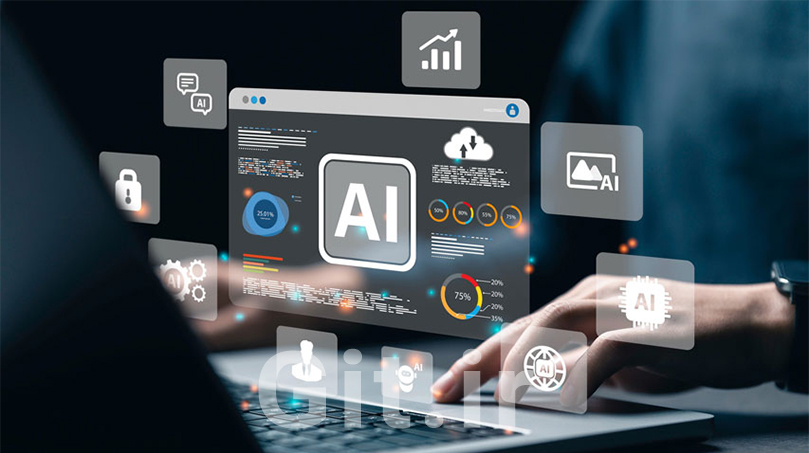Artificial Intelligence in Marketing
Discover how generative AI is transforming marketing and how to stay ahead in a rapidly evolving industry.

What is AI in Marketing?
Artificial intelligence (AI) is revolutionizing how businesses connect with their audiences. It enables marketers to automate tasks, gain deep insights into customer behavior at scale, and deliver highly personalized experiences.
Marketing teams have a unique opportunity to gain a competitive edge by integrating AI into their strategies. By implementing a strong marketing strategy and providing team training with the latest AI tools, organizations can transform their approach to engaging with consumers.
In this article, we will explore how AI is used in marketing.
▶️ View Course: Advanced Artificial Intelligence in Digital Marketing Bundle
Real-World Examples of AI in Marketing
AI has a wide range of applications in marketing. Here are some real-world examples that you may encounter regularly:
AI-powered Dynamic Pricing: Algorithms adjust prices in real time based on factors like demand, competitor pricing, and more. This is commonly seen with Uber’s ride-sharing service or airline ticketing platforms.
Personalized Recommendations: Algorithms analyze user behavior to suggest products or content tailored to individual preferences. Services like Spotify and Netflix use this to recommend music or shows to users.
Customer Support Chatbots: AI-powered chatbots, using natural language processing, interact with customers to answer their questions and provide assistance. These bots are becoming a key part of customer support systems in various industries.
Benefits of AI in Marketing
AI in digital marketing, including social media, email marketing, search engine optimization (SEO), mobile apps, and display advertising, can significantly improve how consumers engage with your brand online. By adopting AI-powered marketing techniques, your business can stay competitive in a rapidly changing marketplace. Let’s explore some additional ways AI can benefit marketing teams and organizations as a whole.
- Automate Repetitive Tasks: AI technology allows marketers to automate tasks such as scheduling social media posts, sending email campaigns, generating traffic reports, and hosting recurring webinars for registered attendees. With these tasks automated, marketing teams can focus more on strategic and creative efforts, like building stronger customer relationships and discovering new marketing opportunities.
Segment Customers Effectively: AI analyzes various customer data and uses algorithms to segment customers based on factors such as purchase history, behavior, and interactions. This helps marketers tailor their strategies to different customer groups more effectively.
Create More Personalized Marketing Campaigns: By identifying patterns and trends in customer data, AI can predict future behaviors, allowing marketers to anticipate customer needs and craft more personalized campaigns that resonate with each individual.
Generate Better Content Faster: Generative AI tools like ChatGPT enable marketers to quickly explore topic ideas, conduct research, and generate examples of marketing content. These AI programs can even help create content that reflects the latest marketing trends, saving time while maintaining quality.
- Enhance Customer Experience: AI can significantly improve customer experiences by offering more efficient support, personalized product recommendations, and seamless interactions across multiple channels. With AI systems in place, customers can enjoy a smoother journey, from browsing to purchasing, which can also help foster long-term loyalty to your brand.
🔷Learn more: Understanding Artificial Intelligence: Definition, Applications, and Types
Challenges of AI in Marketing
While AI offers many benefits, there are also challenges, especially concerning data, that marketing teams must consider as the technology continues to evolve.
Transparency: Marketers must address how to disclose when content, such as industry reports or blog articles, is generated either partially or fully by AI. Additionally, businesses need to stay informed about regulations regarding data usage and ensure they properly inform customers about how their data is being utilized.
Intellectual Property: AI in content marketing raises concerns about intellectual property when AI systems generate new content using third-party materials without proper attribution. This can lead to disputes over ownership, such as whether it belongs to the user, the prompt engineer, the creators of the original data used to train the system, or the AI system itself.
Legal and Ethical Concerns: AI systems often handle large amounts of data, which raises important questions about how customers’ personal data is stored and used. Marketers must ensure that data is protected to avoid security breaches. Additionally, there are ethical concerns about liability when AI marketing tools make errors or deliver inaccurate results.
Data Quality Concerns: The effectiveness of AI in marketing heavily depends on the quality of the data used. Poor-quality data can lead to inaccurate insights, misinformed decisions, and ineffective marketing campaigns. Ensuring data accuracy, consistency, and completeness is crucial for AI systems to function properly and deliver the desired results.
▶️ View Course: The Complete Prompt Engineering for AI Bootcamp (2024)
▶️ View Course: Product Owner Certification & Exam Prep + Scrum Master & AI
How to Use AI in Marketing
By developing a strong AI marketing strategy, you can help your organization thrive in a rapidly changing business environment. Here are some steps to maximize the potential of AI technology for your team:
1. Conduct a Marketing Team Brainstorming Session
The goal of this session is to gain a clear understanding of the marketing team’s initiatives, projects, and challenges. For example, the team may be focused on building brand awareness or promoting a new product line. You may find that their current technology stack is missing key features or that team members are spending too much time on repetitive tasks.
Collecting this information will allow you to identify the most effective AI marketing tools and strategies that align with the team's needs.
🎧 Listen to the audio summary of Brainstorm
Tip: Involve leaders from other teams within the organization during the brainstorming session. This helps align marketing efforts and the use of AI technology with the broader business goals of the organization, ensuring a unified approach across departments.
2. Research AI Marketing Tools and Platforms
With a clear set of goals and challenges in mind, have your team research a variety of AI marketing tools that can enhance marketing effectiveness. Explore tools across different areas of marketing, such as content creation, branding, and social listening.
Here’s a brief list of tools to get you started:
Sprout Social: Offers sentiment analysis, reputation management, social media scheduling, automated workflows, and customer service chatbots.
DALL-E: Generates customizable, brand-specific images.
Keyword Insights: Supports content research, writing, and search engine optimization (SEO).
Zapier: Automates tasks and enables the creation of custom chatbots.
Optimove: Provides data-powered multichannel marketing and personalization.
Microsoft Copilot: Integrates with the Microsoft suite of products to enhance your marketing efforts.
Once the team has compiled a list of potential AI marketing tools, begin testing them and exploring their features to identify the most effective options. Take into account factors such as pricing, ease of use, support documentation, customization, and user reviews. Be sure to gather feedback from team members throughout the process to evaluate the strengths and weaknesses of each tool.
🔷 View the list of AI Tools
▶️ View Course: How to Research and Write Using Generative AI Tools
3. Create an AI Training and Upskilling Program
After finalizing your AI marketing technology stack, it’s essential to implement a comprehensive training program to ensure your team can seamlessly integrate the tools and processes into their workflow. When designing the training program, consider the following elements:
Tutorials: Provide detailed tutorials that teach the team how to effectively use the tools and their various functions.
Survey Forms: Use surveys to gather feedback from team members about their experience with the tools and identify areas for improvement.
Periodic Follow-up Training: Schedule regular follow-up training sessions to keep the team's AI marketing skills up to date and provide opportunities for brainstorming new marketing initiatives.
This approach will help ensure that your team remains proficient in using AI tools and is always ready to leverage new marketing strategies.
4. Implement an AI Marketing Strategy
Begin by updating your marketing strategy to reflect your team’s growing skills and capabilities with AI tools. Ensure that the strategy is aligned with your marketing and business goals, outlining the specific tactics the team will use to achieve these objectives. Here are some goal-driven examples:
Increase Email Subscriber Conversion Rates: Use a customer relationship management (CRM) system that segments customers, personalizes email content, and automates product recommendations based on customer data.
Optimize Long-form Content for SEO: Utilize an SEO tool that identifies trending topics, keywords, and click-worthy headlines, while also offering valuable research to optimize your content for search engines.
Create a Customer Loyalty Program: Implement an AI system that analyzes customers' purchase history, behavior, and preferences to offer personalized rewards, helping to increase engagement and retention.
This strategy ensures that AI tools are used effectively to support your marketing goals and enhance your team’s capabilities.
5. Evaluate the Results and Look for Ways to Improve
After implementing an AI marketing strategy, it’s crucial to periodically assess its effectiveness. Consider the following questions to measure success and identify areas for improvement:
Time Savings: How much time do team members save by using AI marketing tools? Are they able to focus more on strategic and creative tasks?
Campaign Comparison: How do the results of recent campaigns compare to previous ones? Are there noticeable improvements in key metrics such as engagement, conversion rates, and sales?
Return on Investment (ROI): What is the ROI of the AI tools being used? Are the tools delivering enough value to justify the investment?
Regularly evaluating these aspects will help you refine your AI marketing strategy and continue improving its effectiveness.
Tip: Consider setting up an A/B test to compare AI-powered marketing campaigns with traditional marketing campaigns. This will help you determine which campaigns perform better, providing valuable insights into the effectiveness of AI tools and strategies in your marketing efforts.
▶️ View Course: Bayesian Machine Learning in Python: A/B Testing
🎧 Listen to the audio summary of AI Superpowers
Please Log in to leave a comment.
